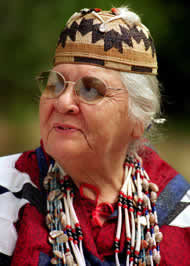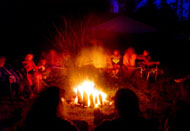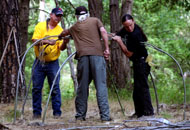|
|
Canku Ota |
|
||||||||||||
|
(Many Paths) |
||||||||||||||
|
An Online Newsletter Celebrating Native America |
||||||||||||||
|
July 3, 2004 - Issue 116 |
||||||||||||||
|
|
||||||||||||||
|
Tribal elder keeps Salmon Ceremony going Strong |
||||||||||||||
|
by Karen McCowan - The (Eugene, OR) Register-Guard |
||||||||||||||
|
||||||||||||||
|
At 79, Agnes Pilgrim still leads the annual sacred salmon ceremony she helped revive a decade ago. An honored elder with the Confederated Tribes of Siletz, she normally uses a motorized wheelchair because of a herniated disc and an atrophied foot. But she is so energized by this event and this place that she gets around here with only a cane. Rising at dawn, she hollers a wake-up call to summon sleepy campers to a sunrise prayer circle. Pointing with her crooked cane, she directs details of a 200-person feast, down to making sure there are clean white tablecloths and vases of flowers. Raising her hand and chanting a prayer, she waves a smoldering braid of sweet-grass over ceremonial utensils. As granddaughter Tonya Nevarez Rilatos watches closely, Pilgrim blesses the freshly spaded fire pit, the obsidian blade to cut the fish, the sharpened redwood stakes used to bake it.
"We bless the female salmon," Pilgrim prays, "for her long, dangerous journey up the river to spawn, still nurturing as she dies." Sharing
traditional values "This is beautiful ground," she says. "This spot was occupied by the First Nation People of the Takelma for over 20,000 years. Our people have a legend that salmon were people like us, who lived in beautiful cities below the ocean floor and chose to come back every year in the form of salmon to feed us." The ceremony acknowledges that sacrifice - and humans' duty to ensure the survival of salmon in return. "I teach reciprocity," Pilgrim says. "Our people used to do things in moderation. They loved the salmon, so didn't fish them out. We've gotten away from that. We've made garbage dumps of our rivers and streams." Salmon were important to the survival of dozens of Northwest tribes, including the Kalapuya who lived in the Eugene-Springfield area. More than two dozen bands formed the Confederated Tribes of Siletz, and many of their descendants conduct salmon ceremonies, says Selene Rilatos, the tribes' cultural activities coordinator. "The salmon is held very sacred to the native people," she says. But she knows of no other ceremony that is open to the public. Pilgrim, in fact, has been criticized for including non-Indians, as she did at last weekend's 11th annual ceremony just below Applegate Dam, south of Grants Pass. "One woman said to me, `If this is a sacred ceremony, why are all these people here?' " she recounts. "I said, `Because everyone eats salmon nowadays, so we need to teach everyone to give back.' " Salmon
matriarch Her role as matriarch is evident around the campfire the night before the ceremony. Her sharp eyes notice a new arrival, a mother with a young child, behind the fire-lit circle.
"Give her a chair with that baby, Shay," Pilgrim directs her grandson. "Move it up to the fire - she looks cold." Though clearly in charge of the ceremony, Pilgrim makes a point of involving others to ensure it will survive her.
As eager young people thread each 3-inch filet onto a redwood stake, Pilgrim reminds them how to do so - "belly meat up, so the oil runs down," and shows them how to slip the sharpened stake just between skin and meat. "What if I died tomorrow?" she asks her apprentices at one point. "Could you guys go ahead and do this without me? Sure you could!" Rilatos, 37, says her grandmother has long trained family members to become leaders one day. "When I was little, she'd have us walk across the room with Webster's dictionary on our heads," Rilatos recalls. "She said, `Oppression is still alive and well, and you will face prejudice, but stand up strong and tall, and never be ashamed of who you are.' " Latecomer
to tradition Yes, her great-grandfather was chief when the Army marched his Takelma tribe 150 miles north to the Siletz reservation. Yes, her grandfather, Jack Harney, was the first elected chief of the Confederated Tribes of Siletz. But by 1924, when she was born on the Lincoln County reservation, her family no longer celebrated a formal salmon ceremony. The ranks, languages and practices of individual tribes had been decimated by disease, intermarriage and schools bent on assimilating Indian students into white culture. And so, after graduating from Taft High School, Pilgrim embraced a more urban life. She worked as a nurse in Portland and Vancouver. She married and raised six children. But something about Southern Oregon felt like home. At 52, she moved to Grants Pass and enrolled at Ashland's Southern Oregon University. Studying local tribal culture while earning a degree in psychology and American Indian history, she learned something shocking. "A lot of people around here thought all the Takelma people were gone," she says. With her late husband, Grant Pilgrim, a member of Northern California's Yurok tribe, she set out to resurrect her heritage. She has since traveled all over the world as an expert on traditional culture and environmentalism. In 2002, she was Southern Oregon's alumna of the year for her work reviving traditional ways. With Northern California resident Dennis Martinez, an O'odham tribal member, the Pilgrims created the Takelma Intertribal Project. The goal was to teach native ways of managing forests and streams. They set out to find a natural setting where they could do it. "Keep
it up" "A guy from Fish & Wildlife came to me the next spring and said, `We don't know what you've done, Aggie, but keep it up - there's more fish in that river than ever before!' " she remembers with relish. Charles Fustish, the current state salmon enhancement biologist for the area, has no idea who might have made the remark. But department fish counts back it up, he says. The 1995 spring chinook numbers at nearby Gold Ray Dam set a record that still stands: 81,845 salmon passed through the Applegate that year, up from 14,000 in 1994. Fish runs fluctuate because of factors ranging from water volume and temperature to previous years' commercial fishing limits. After Grant Pilgrim died in 1996, Aggie Pilgrim assumed sole leadership of the salmon festival. "For years, she even paid for it herself," says Patricia Ciminelo, a Grants Pass neighbor who volunteers on the salmon committee. "A few years ago, we started seeking donations, and next year we hope to get a grant-writing committee going." As the feast winds down, Pilgrim moves among the tables in her tribal regalia, greeting old friends and meeting newcomers. What would her grandparents and great-grandparents have thought of such a gathering here?
CONFEDERATED TRIBES OF SILETZ Who: 27 bands originally ranging from Northern California to southern Washington Reservation: 3,666 acres in Lincoln County Federal recognition: Terminated in 1955; restored in 1977 Members: 3,399 Administration: Tribal headquarters in Siletz; satellite offices in Eugene, Salem and Portland |
|
|
||
|
|
||
| Canku Ota is a free Newsletter celebrating Native America, its traditions and accomplishments . We do not provide subscriber or visitor names to anyone. Some articles presented in Canku Ota may contain copyright material. We have received appropriate permissions for republishing any articles. Material appearing here is distributed without profit or monetary gain to those who have expressed an interest. This is in accordance with Title 17 U.S.C. Section 107. | ||
|
Canku Ota is a copyright © 2000, 2001, 2002, 2003, 2004 of Vicki Barry and Paul Barry. |
||
 |
 |
|
|
The "Canku Ota - A Newsletter Celebrating Native America" web site and its design is the |
||
|
Copyright © 1999, 2000, 2001, 2002, 2003, 2004 of Paul C. Barry. |
||
|
All Rights Reserved. |
||
 RUCH
- "Grandma Aggie" is in her element: a meadow along the
Applegate River where her ancestors once lived, presiding over a
rite once common among Western Oregon Indian tribes.
RUCH
- "Grandma Aggie" is in her element: a meadow along the
Applegate River where her ancestors once lived, presiding over a
rite once common among Western Oregon Indian tribes. Later,
as the first cooked salmon comes off the fire, Pilgrim slices a
bite for each of the participants, who return the bone and skin
to her. Drums thump as four young men emerge from a sweat lodge,
skin flushed by the heat of the purification rite. Each holds cedar
boughs to wrap up the bone and skin offering. As they run to the
frigid river to dive in and leave their bundles on the bottom, the
women dance in a circle.
Later,
as the first cooked salmon comes off the fire, Pilgrim slices a
bite for each of the participants, who return the bone and skin
to her. Drums thump as four young men emerge from a sweat lodge,
skin flushed by the heat of the purification rite. Each holds cedar
boughs to wrap up the bone and skin offering. As they run to the
frigid river to dive in and leave their bundles on the bottom, the
women dance in a circle. Son
Keith Taylor, a Eureka, Calif., attorney, assists his mother in
slicing the $1,060 worth of salmon donated for the ceremony by the
Siletz tribes' Chinook Winds Casino.
Son
Keith Taylor, a Eureka, Calif., attorney, assists his mother in
slicing the $1,060 worth of salmon donated for the ceremony by the
Siletz tribes' Chinook Winds Casino.  When
the three found this meadow on public land just below Applegate
Dam, Aggie Pilgrim immediately recognized its suitability. She tells
and retells a story that seems to confirm the power of the first
revived salmon ceremony here in 1994.
When
the three found this meadow on public land just below Applegate
Dam, Aggie Pilgrim immediately recognized its suitability. She tells
and retells a story that seems to confirm the power of the first
revived salmon ceremony here in 1994. "I
wish they could have seen it," she says, surveying the crowd.
"They would have been so proud. But they know. They know."
"I
wish they could have seen it," she says, surveying the crowd.
"They would have been so proud. But they know. They know."